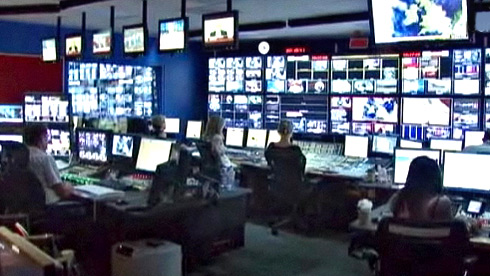Remaining impartial is a true challenge for the station’s 400 staff from some 30 nationalities, each with their own vision of the world. To ensure that they do, "there are safeguards," explains deputy editor-in-chief François Chignac — chief among them, the way the newsroom is organised. It is divided into various departments (world, economics, etc.) each composed of 11 journalists, one representing each of the languages broadcast on Euronews – the Greeks stay on their own.
"This diversity is a constant challenge," explains Pedro Lasuen, head of the sports department. "I myself am from a country, Spain, where we do not cover winter sports. So when the English journalist proposes a story on cricket, you can imagine that the entire department trembles," he adds. Despite strict rules dictating the choice of stories, "there is always someone who doesn't agree. The journalists all want to satisfy their national audiences," he admits.
Once the subjects for the broadcast are decided and the video images selected, it is up to the 11 journalists to write a commentary, in their own language, which will not be the same as that of their colleagues. This is a matter of style, which differs with each culture, but it is also a question of presenting the news in a way that is adapted to specific countries. For example, "with regard to Mali, the French journalist will give the number of soldiers on the ground but the Ukrainian journalist won't," says Francois Chignac. The form changes but not the content, he says, because "the video is the main priority."
Checking pronunciation
On rare occasions there is a major divergence in the commentary. Miguel Sardo found this out during the 2002 shipwreck of the Prestige oil tanker off the Iberian Peninsula. "The question was whether or not the coast was exposed to an oil spill," remembers the Portuguese journalist, who explains that "the Spanish news editor kept repeating his government's very cautious position, while I had information from the Portuguese Navy mentioning oil slicks threatening the coast."
Some recurring topics are even more sensitive: how should one qualify the Basque separatist organisation ETA, which is considered differently by the French and the Spanish governments? In headlines, which are the same for all the language broadcasts, can one use the term "Armenian genocide", given that the 1915 massacres [of Armenians by the Ottoman government] are not recognized as such in Turkey, and, along with other national broadcasters, the Turkish public television channel TRT, is a shareholder in Euronews? "I sometimes hear calls for caution, but on the whole, we have a lot of freedom," says one journalist. "It's a burden that keeps us from following through on certain issues," complains another.
"It's important to take into consideration the different national sensitivities," admits Romanian news director Lucian Sârb. But without sacrificing the news, adds this lover of "facts". "It took us 20 years to make Euronews the most unbiased news broadcaster," he adds. Ali Ihsan Aydin who heads the Turkish-language team, which includes an Armenian and a Kurd, agrees. "The common approach prevents journalists from acting as spokesmen for national causes," he says, adding that this "is a true guarantee of neutrality". And of quality, the journalists say. "To check the pronunciation of a name or to call local sources, we can always find a colleague from the country in question," explains Iranian journalist Babak Kamiar.
Of course, this takes a toll on style at Euronews. "The best solution is to remain neutral, borderline boring," says Pedro Lasuen, the head of sports. He organises an in-house football tournament, mustering teams by country of origin. The most recent winner was the admin department which, perhaps symbolically, had gathered a multi-national team.
Counting the seconds until the move
The station is set to move offices in year’s time — there is a screen counting down the seconds until the move in the Euronews foyer — however, it will stay in Lyon, the French city where it began broadcasting in on January 1, 1993. At the time there were only five languages: English, German, Spanish, Italian and French.
Twenty years on, Euronews is Europe's leading 24-hour news station with an audience of 3.4 million per day, far ahead of CNN (1.6 million) and the BBC World Service (1.2 million). In spite of increasing competition from national news channels, Euronews has continued to grow. Having adding Portuguese, Russian, Ukrainian, Arabic, Turkish, Farsi and Greek programming, a segment in Hungarian (the station’s 13th broadcast language) will be launched later this year. Since 2004, Euronews has been broadcast all over the world. Its most significant shareholders, in terms of capital are: France Télévisions, Rai (Italy), RTR (Russia), TRT (Turkey) and SRG SSR (Switzerland).
Was this article useful? If so we are delighted!
It is freely available because we believe that the right to free and independent information is essential for democracy. But this right is not guaranteed forever, and independence comes at a cost. We need your support in order to continue publishing independent, multilingual news for all Europeans.
Discover our subscription offers and their exclusive benefits and become a member of our community now!












